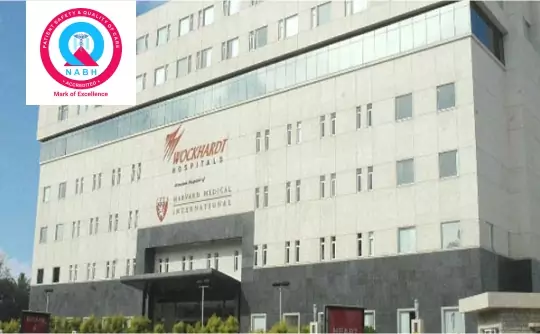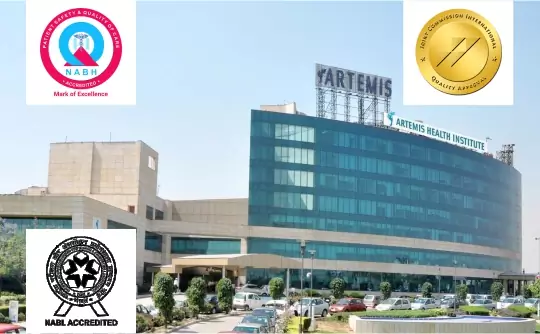

Knee Replacement Cost in India starts from US $3,900 for a single knee and $7,500 for both knees and varies with the type of implant, technique of surgery, your medical history and condition, surgeon, hospital and the city where you choose to get the surgery done.
An important expense when it comes to your Knee Replacement cost in India is going to be your orthopedic surgeon's fees. IndiCure hand-picks an experienced, skilled, board-certified surgeons who are capable of delivering successful knee replacement surgeries. Although, the price tag may vary depending on the experience of the surgeon.
A significant portion of the overall cost of a Knee Replacement arises from the cost of the knee implant. This includes the material the implant is made up of. The other factor is the use of any customized surgical instruments or specialized computer technology. With the hopes of improving patient care, new techniques and technologies are often introduced to the surgical process. Such innovative advancements in the surgical approach can increase costs.
Having your Knee Replacement in an accredited surgical facility by skilled and qualified medical staff is a critical factor. Moreover, the geographical location of this facility also affects the initial quote. But, IndiCure provides you with a projected estimate that will be all inclusive and affordable.
The surgery-related expenses include the pre- and post-surgical expenses. The pre-surgical expenses are associated with the candidacy and the medical history of the patient. This also includes the routine medical exams and tests to ensure you're a good fit for the surgery. Post-surgical expenses can include prescription medications, physical therapy, rehabilitation stay, and follow-up consultations.
We at IndiCure, understand that you travel with a budget in mind and do not like to be greeted by surprises after arrival in India. We thus club all these expenses and give you the package cost that is inclusive and affordable at the same time.
Your case manager shall give you an estimated cost of your surgery after discussing your medical reports with the surgeon. The final cost, however, shall be confirmed after your consultation with the surgeon.

We Help you Choose the Right Treatment, Surgeon & Hospital

We Arrange Video/Telephonic Consultation with the Surgeon

We Assist you with Visa & Accommodation

We Receive you at the Airport and Drop you at Hotel/Hospital

We Assist you the at Hospital & Provide Post Operative Support
In fact, we have Special Negotiated Rates with the Hospitals and you can avail Discounted Rates when you choose to Travel with IndiCure.


WockHardt Hospital
Mumbai
Wockhardt Hospitals is the branch of the leading Wockhardt pharmaceutical company in India. The company is more than four decades old and is present in more than 20 countries around the globe. Wockhardt has 9 hospitals in India in Mumbai, Nagpur, Rajkot, Nashik, and Surat.

Artemis Hospital
Gurgaon
Artemis Health Institute, a premium multi-specialty hospital is a healthcare venture launched by the promoters of the Apollo Tyres Group. Established in 2007, Artemis was the first hospital in Haryana to get NABH accreditation within 3 years of start-up.
Simple actions like walking or climbing stairs may be difficult to perform if your knee is significantly injured by arthritis or injury. It's possible that you'll start to feel pain while sitting or lying down.
If nonsurgical treatments such as medicines and the use of walking aids are no longer effective, knee replacement surgery may be an option. Joint replacement surgery is a safe and effective way to ease pain, correct leg deformities, and get back to your daily routine.
Treatment alternatives to Knee Replacement include:
Because only the surface of the bones are replaced, a knee replacement (also known as knee arthroplasty) is more correctly referred to as a knee "resurfacing."
A knee replacement technique consists of four essential steps:
You, your family, your primary care doctor, and your orthopedic surgeon should all work together to make the decision to have knee replacement surgery.
Your doctor may recommend knee replacement surgery for a variety of reasons. The following are common characteristics of people who benefit from knee replacement surgery :
Patients with bent knee deformities, such as the one depicted in this photo, will benefit from total knee replacement.
Knee replacement surgery does not have any age or weight restrictions.
Surgery is recommended based on a patient's discomfort and handicap, not their age. The majority of patients who get total knee replacements are between the ages of 50 and 80, but orthopedic surgeons assess each patient individually. Knee replacements have been successfully performed on patients of all ages, from teenagers with juvenile arthritis to the elderly with degenerative arthritis.
There are 3 techniques used for the knee replacement surgery:
Traditional Knee Replacement: This procedure is done under general anaesthesia. An 8-12 inch vertical incision is made in the front of the knee. The surgeon then prepares the bone to remove the damaged bone and cartilage surfaces at the end of tibia and femur.The cartilage and bone that are removed are replaced with artificial metal components made of alloys or high grade polymers. The metal components are cemented to the underlying bone for proper fit. The lower surface of the kneecap (patella) is removed and resurfaced. A spacer is inserted between the metal components for smooth gliding between the surfaces. The surgery takes about 2-3 hours. Rehabilitation is advised after the surgery as guided by the surgeon.
Minimally Invasive Knee Replacement: Unlike traditional knee replacement surgery, the minimally invasive knee replacement is less invasive performed using smaller incisions of 4-6 inch. The artificial implants used are the same as used in traditional replacement. However, the bones are prepared using specially designed surgical equipment for proper placement of the implants. This technique is less invasive with less damage and disruption of the adjacent structures that results in reduced postoperative pain, smaller scars and early recovery.
Computer Navigated Knee Replacement: Computer navigation Knee Replacement using NAV3 technology is the most advanced and revolutionary surgical procedure that is being performed in India with great success. This technique improves the accuracy of the prosthetic implantation with further minimizing the need for surgical exposure resulting in less scarring, faster recovery and thus improving the short and long term performance of the knee joint.
General anesthesia (putting you to sleep) and spinal, epidural, or regional nerve block anesthesia are the most common types of anesthesia (you are awake but your body is numb from the waist down). Your anesthesia experts will advise which form of anesthesia is ideal for you.
The surgery normally takes between two and three hours. To reestablish the alignment and functionality of your knee, your orthopedic surgeon will remove the damaged cartilage and bone and then place new metal and plastic implants.
The surgeon makes a vertical incision in the front of the knee. The surgeon then prepares the bone to remove the damaged bone and cartilage surfaces at the end of tibia and femur.
The cartilage and bone that are removed are replaced with artificial metal components made of alloys or high grade polymers. The metal components are cemented to the underlying bone for proper fit.
The lower surface of the kneecap (patella) is removed and resurfaced. A spacer is inserted between the metal components for smooth gliding between the surfaces.
You will have some discomfort after the surgery. This is a common thing during the healing process. Your doctor and nurses will attempt to lessen your pain, allowing you to recover more quickly from surgery.
Medications are frequently provided for short-term pain management. Nonsteroidal anti-inflammatory drugs (NSAIDs), acetaminophen, and local anesthetics are among the medications available to assist control pain.
The results of knee replacement surgery are very gratifying. The patient is relieved of the knee pain completely and is able to enjoy an active lifestyle.
You would not be advised to do certain high impact activities like jogging and jumping for a few weeks by the surgeon. An elderly patient above 80 is able to do the activities of daily living which were painful or not possible earlier.
Metal detectors, which are necessary for security in airports and some businesses, may be triggered by your new knee. If the alarm goes off, tell the security worker about your knee replacement. We shall give you a letter that states that you have had a knee replacement and have an implant in the knee, which can be shown to the security.
We at IndiCure completely understand your concerns and it is always our endeavor to provide the best outcome for every patient. Following is the list of questions you must ask before you embark on your journey for Knee Replacement surgery in India.
Prepare to answer questions about your:

There is absolutely no catch. The Knee replacement surgery cost in India and for that matter, medical treatment in India is much less because of the following reasons:
Low cost of endowment in India - Qualified doctors, surgeons, nursing staff, lower investments costs, subsidies by government to private healthcare sector are more as compared to other countries
An exchange rate regime, which is favorable to India (indicative rates only, may not be currently applicable)
1 USD= 75 Indian rupees
1 GBP= 100 Indian rupees
1 Euro= 85 Indian rupees
Yes, Knee replacement surgery is a major surgery that is usually advised only after other therapies, such as physiotherapy or steroid injections, have failed to relieve pain or improve mobility. If you have severe pain, swelling, and stiffness in your knee joint, and your mobility is limited, you may be advised knee replacement surgery.
Yes, there are 2 variations of TKR.
Removal of the posterior cruciate ligament (posterior-stabilized)- When the knee bends, the posterior cruciate ligament, a big ligament in the back of the knee, offers support. During the TKR procedure, the surgeon will remove this ligament if it can't support an artificial knee. Special implant components (a cam and post) stabilise the knee and provide flexion in its place.
Preservation of the posterior cruciate ligament (cruciate-retaining)- The surgeon may leave the posterior cruciate ligament intact when implanting the prosthesis if it can support an artificial knee. The artificial joint utilised is called a "cruciate-retaining" joint because it contains a groove that accepts and maintains the ligament, allowing it to continue to provide knee stability.
Discuss with your doctor about which one is the better option for you.
Unfortunately, even when arthritis is severe, some people may not be able to get a knee replacement.
This could be due to the following reasons:
You would look for other alternatives like Ayurveda treatment which offer long term relief from knee pain and other disabilities.
Quadriceps Sparing Approach is a minimally invasive technique to perform knee replacement.
During the procedure, the surgeon lifts the kneecap to the side and cuts away the arthritic bone without cutting through the quadriceps tendon after making a small incision. As the name implies, the quadriceps-sparing procedure is less invasive than the traditional knee replacement surgery. It reduces the amount of damage to the quadriceps muscle as much as feasible.
Because access to the joint is gained from beneath (sub) the vastus muscle, this method is also known as "subvastus" (the largest part of the quadriceps muscle group).
Midvastus is another version of a quadriceps-sparing strategy. It likewise avoids cutting the quadriceps tendon, but instead of passing under the vastus muscle to totally spare it, the muscle is split along a natural line across the middle in this surgical method.
Although the subvastus and midvastus techniques take longer to conduct, they result in a quicker recovery. This is because the underlying thigh muscle receives little to no stress, making it easier to walk sooner after the operation.
The state of your knee and associated tissues will determine whether you are a good candidate for this approach. Talk to your surgeon about it.
Lateral approach is another minimally invasive technique for knee replacement, but is rarely employed. It's more common in people who have a tendency to bend their knees outward. The surgeon approaches the knee joint from the side, or laterally. Because the lateral technique preserves much of the quadriceps, it is less intrusive than typical surgery and allows patients to return to walking sooner.
The hospital stay is reduced to three to four days, and the recovery time is reduced to four to six weeks with minimally invasive surgery. People who had a PKR reported less pain and were able to resume daily activities more quickly and effectively than those who underwent traditional surgery.
Studies have shown that after a year, no significant differences existed between the patients who underwent traditional surgery and those who underwent minimally invasive procedures. The long term results are the same.
Minimally invasive procedures aren't right for everyone. Our surgeons thoroughly assess each patient and choose the best treatment option. According to one study, it takes around an hour longer than regular surgery. To discuss your alternatives, speak with your surgeon.
Yes, with newer and advanced surgical techniques, both knee replacement surgeries can be done at the same time. Our surgeons usually replace both the knees at the same time, unless you have any specific medical condition that does not allow that.
More than 90% of current total knee replacements are still in good working order 15 years following surgery. Following your orthopedic surgeon's post-surgical instructions and taking precautions to protect your knee replacement and overall health are critical ways you may help your surgery succeed. Also, how carefully you follow your orthopedic surgeon's recommendations at home during the first few weeks after surgery play a major role in the success of your surgery.
For the first six weeks, avoid sitting with your legs crossed. After three months, when the scar tissue has healed sufficiently, you can try kneeling on a soft surface. Kneeling may never be fully comfortable, but as the scar tissue hardens, it should grow easier.
After knee surgery, you don't need to sleep in a specific posture. You should not, however, lie with a pillow beneath your knee. While this may feel comfortable, it might cause muscle tension, making it difficult to straighten your knee.
The first step is to send us your medical history, X-ray and other medical reports for the surgeon's evaluation. You can send these details to info@indicure.com. You would be assigned a case manager who shall get back to you with the surgeon's opinion, cost and other necessary details. For more information, please visit our Step-by-step guide
Your case manager would share the surgeon's opinion as is, his or her detailed profile, details about the hospital where your surgery shall be done, type of implant and other necessary details. You can also choose to speak with the surgeon over phone or have a video consultation with the surgeon. We make sure you get the best quality treatment and best possible results for your surgery in India. To answer more on Medical Tourism related questions read our General FAQs sections.
The rehabilitation will begin the next day itself. Your physical therapist will do a number of exercises to regain your strength and range of motion. You should continue to exercise until your muscles are pain-free and you can walk without a limp. It is a good idea to continue your exercises as a lifetime commitment to keep your muscles strong.
The materials used for total knee replacement include titanium, cobalt chrome, and polyethylene. To date, there is little evidence suggesting any allergic reaction to these materials.
Yes, they usually do. The hospital shall provide you with the letter stating that you have a metal prosthesis fixed inside your knee which shall help you clear through the security checks without facing any problems. You should reach the airport a little early to avoid any inconvenience.
If other non-surgical treatment options like medication, exercises, physiotherapy have failed, knee joint replacement is the best option for your pain. It has become the gold standard for treatment of end stage arthritis owing to its high success rate and good quality of life after the operation. Even the cost is quite affordable. Owing to its many advantages, Knee replacement has almost become a routine surgery performed on over 700,000 people worldwide each year.
However, if for some reason you do not wish to undergo surgery, or you are not a candidate for the surgery, there are other non-surgical and non-conventional treatment options for you in India. Alternative Treatment - Ayurveda is an ancient Indian medical practice that dates back over 3,000 years. Internal cleansing is the first step in Ayurveda treatment, followed by a particular diet, herbal treatments, massage therapy, yoga, and meditation. There are various Ayurveda treatment options available to completely cure knee pain. Talk to your case manager and he/she shall be able to help you.
Make your medical trip to India even more comfortable and complete with our range of additional services, designed to take care of all your needs beyond the hospital.
Traveling abroad for medical reasons can be challenging if you are alone, but with IndiCure by your side, it doesn't have to be. With over fifteen years of experience and an exclusively curated network of India's best surgeons and top hospitals, we make your medical tour to India easier and safer. We will guide you at every step, handling all the end-to-end arrangements for your surgery, travel, and stay.
Ramandeep Dhaliwal
a month ago
I had great experience having rhinoplasty through Indicure. Dr. Ruchika from Indicure has helped me in finding best plastic surgeon, answering all my questions...
Ramandeep Dhaliwal's Full Review
Joshua Archer
3 months ago
My name is Joshua Archer I'm from New Zealand, bay of plenty, kawerau I opted for the bypass surgery in January 2023 but planned it in advance for 28 September found IndiCure...
Joshua Archer's Full Review
Kera Ren
8 months ago
Absolutely loved my experience with IndiCure - from first inquiring to meeting the surgeon pre op to my follow up post op. The surgeon was extremely approachable...
Kera Ren's Full Review
Andreana Paul
5 months ago
Had a wonderful experience. Visited India for my plastic surgery. From sending mails, airport pickup, comfortable accommodation and, to smooth hospital appointment booking...
Andreana Paul's Full Review
Brandi Luce
5 months ago
I had the privilege of using Indicure's services for a cosmetic procedure that I had wanted for a long time but had always been apprehensive about. Ruchika helped me...
Brandi Luce's Full Review
Jade M
3 years ago
Indicure Health Tours went above and beyond my expectations. They helped me with every aspect of my journey and were professional, kind and caring. I was...
Jade M's Full Review
The content on the website (www.indicure.com) is intended to be general information and is provided only as a service. All photographs on our website of before and after results are examples only, and do not constitute an implied or any other kind of certainty for the result of surgery.
Learn about IndiCure Health Tours' comprehensive editorial policy that strives to deliver trustworthy, helpful, relevant, accurate and people-first content on medical tourism in India.
It is not medical advice and should not be taken as medical advice. It should not be used to diagnose or treat a health condition and is in no way meant to be a substitute for professional medical care. You are advised to see a surgeon in person to assess what surgery may or may not accomplish for you.
It is also important to keep your expectations realistic and to understand that all surgical procedures carry risks and should never be taken lightly.